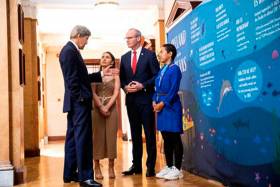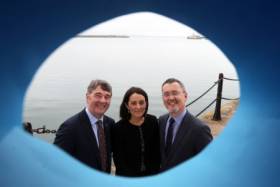Displaying items by tag: Our Ocean Wealth Summit
Former US Secretary of State John Kerry has called for immediate action to move to decarbonisation to manage climate change.
The former US senator and presidential candidate was delivering the first keynote address of the Our Ocean Wealth Summit in Cork City Hall on Sunday 9 June.
In his address, Kerry was passionate about the state of our oceans, and he delivered a hard-hitting speech that criticised governments for not being transparent about climate change and called for urgent implementation of better energy policy.
Sponsored by PwC, the Ocean Wealth Summit was moderated by Marine Institute chief executive Dr Peter Heffernan featured contributions from a number of national and international government officials.
Tánaiste Simon Coveney and Marine Minister Michael Creed were actively engaged in discussion with representatives from Small Island Developing States (SIDS) on how governments could work together to broker key solutions to implement the UN Sustainable Development Goals.
Later at the summit, and together with Minister of State for Housing and Urban Renewal, Damien English, they launched the State’s draft Marine Planning Policy Statement.
This is being touted as “a true recognition of the importance of a fully integrated marine planning system across all aspects of marine forward planning, marine development management and marine planning enforcement”.
The Marine Planning Policy Statement is now open for public consultation until noon on Friday 9 August.
Sunday afternoon sessions at the summit were moderated by Dr Tara Shine. These led with a keynote address by European Parliament First Vice President Mairéad McGuinness on the work that Europe is doing and needs to do to effect decarbonisation and promote a greener, cleaner society to support the oceans health and wealth.
Also speaking at the summit was Ireland’s Youth Ambassador to the Oceans, Alicia O’Sullivan, who delivered a powerful address to motivate people in Ireland to see the impact of decisions at local level, which have national and global impact.
The 17-year-old echoed the words of climate activist Greta Thurnberg when she said that urgent action is required as the “house is on fire”.
#MarineEconomy - Ireland's marine economy worth an annual turnover in excess of €5.7m billion, has been on a steady growth trajectory over the past decade.
Optimising, commercialising, managing and protecting this blue economy, worth over €2 billion directly to the economy each year, is the focus of the Our Ocean Wealth Summit sponsored by PwC which takes place on 28 and 29 June in Galway.
This year's Summit has attracted high level marine sector speakers from across the globe including Blue Planet producer Orla Doherty, US Astronaut and Oceanographer Kathryn Sullivan, Jose Santos, Chairman of the Oceano Azul Foundation (Portugal), Claire Jolly, Head of Ocean Economy at the OECD and Investment Manager with Equinor (Statoil) Jill Tully among other international business and marine leaders.
Minister for Agriculture, Food and Marine Michael Creed T.D., Climate Justice Foundation CEO Mary Robinson, Yvonne Thompson, Partner at PwC, Julie Sinnamon of Enterprise Ireland and BIM CEO Jim O'Toole are among the Irish leaders that will address the Summit on investing in our blue economy and managing the challenges it faces.
"Being an island nation, Ireland has a real opportunity to lead in terms of innovation, competitive advantage in the seafood sector, shipping services, marine industry, renewable energy and connected marine devices and solutions. This event, as a key output of the Harnessing Our Ocean Wealth strategy, brings the vital and various elements of Ireland's marine sector, the experts and experience, together to convene, network and share knowledge required to drive forward our blue economy," said Minister for Agriculture, Food & Marine Michael Creed.
The 2 day conference will focus on Ireland's multi-billion euro marine economy, discussing the impact of Brexit, smart shipping, sea and airfreight logistics and Ireland’s seafood sector, marine renewables, marine research, maritime commerce, financial planning for the marine, climate change and more. See www.ouroceanwealth.ie
Speaking at the launch of the Our Ocean Wealth Summit themed "Investing in Marine Ireland", Marine Institute CEO Peter Heffernan said, "Ireland's oceans represent enormous commercial opportunities and this Summit will be relevant to organisations involved in offshore renewable energy, marine biotech, aquaculture and fisheries, shipping, marine mining and exploration as well as subsea and offshore technology including robotics, communications, sensors and data analytics.
We are also mindful of the need to manage this incredible blue resource to ensure its viability and health into the future. This year's Summit represents an enormous opportunity to be part of a national and international event where marine leaders will be sharing insights, networking and engaging with delegates over the 2 days of the Summit as part of the national maritime festival, SeaFest."
Our Ocean Wealth Summit has a packed agenda that includes an in-depth discussion on Ireland's seafood sector and the impact of Brexit, smart shipping, sea and airfreight and logistics for the fishing sector, an interactive session on marine renewables, as well as insights and thought leadership on climate change. Marine research and development, maritime commerce, financial planning for the marine and aviation leasing will also be topics discussed at the Summit this year.
Speaking at the 2018 launch, PwC Partner, Declan McDonald, said: "The central theme of investment for the 2018 Summit demonstrates how the integrated marine plan for Ireland is moving into a new phase of commercial engagement beyond EU and Government funding. We see this theme developing globally with many investment managers and investors actively engaged in funding projects in line with the UN sustainable development goals. We see significant activity in the ocean economy to attract investors seeking returns beyond philanthropy. PwC in Ireland and globally continues to raise awareness and support the sustainable development of the ocean economy recognising that the oceans' health and wealth are inextricably linked."
Our Ocean Wealth Summit will also include a Marine Ireland Trade Show, where over 60 companies and organisation in the sector will showcase their innovative marine products and services.
Now in its fifth year, Our Ocean Wealth Summit in association with PWC is supported by a number of partners including IDA Ireland, Enterprise Ireland, Sustainable Energy Authority of Ireland (SEAI), Science Foundation Ireland, Failte Ireland, Bord Iascaigh Mhara (BIM) and the Irish Maritime Development Office (IMDO).
The Summit is an output of Harnessing Our Ocean Wealth, the Government's integrated plan for Ireland's marine sector, which aims to double the value of the marine economy's contribution to GDP by 2030.
See www.ouroceanwealth.ie for more details.
























